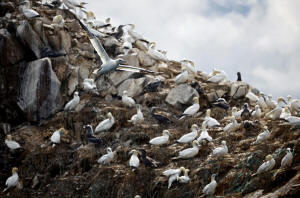Wider bird flu spread raises concern for humans, animal health body says
 Send a link to a friend
Send a link to a friend
 [April 05, 2024]
By Sybille de La Hamaide [April 05, 2024]
By Sybille de La Hamaide
PARIS (Reuters) - The spread of bird flu to an increasing number of
species and its widening geographic reach have raised the risks of
humans being infected by the virus, the head of the World Organization
for Animal Health (WOAH) said on Thursday.
Monique Eloit's comments come after the U.S. government reported cases
of the disease in dairy cows in several states and a person in Texas,
which she said would only be a strong concern if there had been a
transmission between cows, something the U.S. authorities are still
investigating.
Avian influenza, commonly called bird flu, has led to the culling of
hundreds of millions of poultry around the globe in the past years, with
the virus mostly carried by migrating wild birds.
Although the number of outbreaks has been lower this season the virus
has spread to new regions, including South America and Antarctica, and
hit a larger number of animals, decimating colonies of rare species.
Foxes were the mammal species most affected by bird flu but the virus
also infected dozens of other species including cats, tigers, seals,
dolphins and bears.
"Over the last few months, we have had a whole series of diverse and
varied mammals. It is worrying to see this extension to other species,"
the head of the Paris-based organization told Reuters in an interview.
"Ultimately, we find ourselves with more and more species and more
animals which are contaminated, therefore necessarily a higher viral
load with a risk of contamination of humans," she said.
[to top of second column]
|

A view shows the colony of northern gannets on the Rouzic island of
the Sept-Iles archipelago, a bird reserve affected by a severe
epidemic of bird flu, off the coast of Perros-Guirec in Brittany,
France, September 5, 2022. REUTERS/Stephane Mahe/File Photo
 Some outbreaks of bird flu have
caused serious or fatal infections among people who have close
contact with wild birds or poultry but to date there has been no
sustained human-to-human transmission observed. For most people who
are not exposed to infected animals, the risk of catching the
disease is very low, scientists say.
Animal and human flu viruses tend to mutate, raising concern that
one will turn into one which can be transmitted between mammals,
including humans.
The European Food Safety Agency (EFSA) warned on Wednesday of a
large-scale bird flu pandemic if the virus becomes transmissible
between people as humans lack immunity against the virus.
(Reporting by Sybille de La Hamaide; editing by David Evans)
[© 2024 Thomson Reuters. All rights reserved.]This material may not be published,
broadcast, rewritten or redistributed.
Thompson Reuters is solely responsible for this content. |